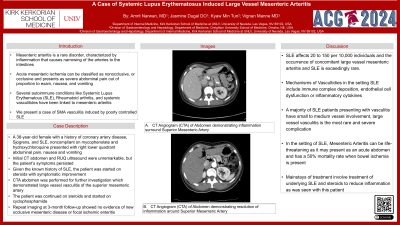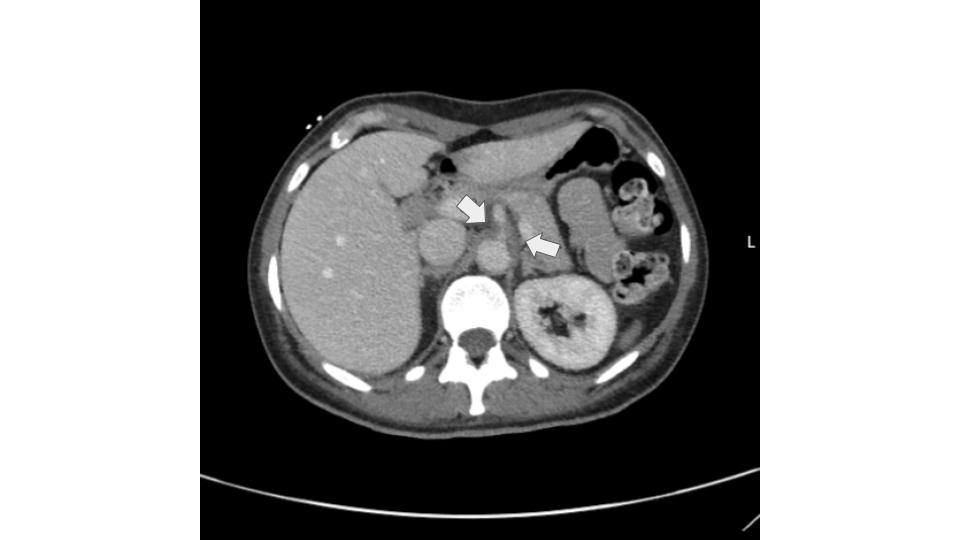Tuesday Poster Session
Category: Colon
P3687 - A Case of Systemic Lupus Erythematosus Induced Large Vessel Mesenteric Arteritis
Tuesday, October 29, 2024
10:30 AM - 4:00 PM ET
Location: Exhibit Hall E

Has Audio

Amrit Narwan, MD
Kirk Kerkorian School of Medicine at the University of Nevada
Las Vegas, NV
Presenting Author(s)
Amrit Narwan, MD1, Jasmine Dugal, DO1, Kyaw Min Tun, DO2, Vignan Manne, MD3
1Kirk Kerkorian School of Medicine at the University of Nevada, Las Vegas, NV; 2Creighton University School of Medicine, Las Vegas, NV; 3Kirk Kirkorian School of Medicine, Las Vegas, NV
Introduction: Mesenteric arteritis is a rare disorder, characterized by inflammation that causes narrowing of the arteries to the intestines. Acute mesenteric ischemia can be classified as nonocclusive or occlusive, and presents as severe abdominal pain-out of proportion to exam, nausea and vomiting. Several autoimmune diseases, including Systemic Lupus Erythematosus (SLE) and Rheumatoid arthritis have been linked to mesenteric arteritis. Here, we present a case of poorly controlled SLE inducing large vessel mesenteric arteritis.
Case Description/Methods: A 38-year-old female with a history of coronary artery disease, Sjogrens and SLE, noncompliant on mycophenolate and hydroxychloroquine presented with right lower quadrant abdominal pain, nausea and vomiting. Her initial CT abdomen and pelvic ultrasound were unremarkable, and the patient had a history of cholecystectomy, hysterectomy and right salpingo-oophorectomy. The patient’s abdominal pain persisted despite completely benign imaging and lab findings, including a WBC count of 6.45. Given the patient's history of SLE, a steroid trial was initiated with clinical improvement. CT angiogram (CTA) of the abdomen was obtained concomitantly for further evaluation which demonstrated large vessel vasculitis of the superior mesenteric artery. Given the new diagnosis of mesenteric arteritis in the setting of undertreated SLE due to medication non-compliance, a course of cyclophosphamide and steroids was initiated to get both pathologies under better control. The patient was discharged home with outpatient follow up on a steroid taper, biologics and outpatient cyclophosphamide infusions. Repeat CTA 3 months after starting steroids showed no evidence of new occlusive mesenteric occlusive disease or focal ischemic enteritis
Discussion: SLE affects 20 to 150 per 10,000 individuals and the occurrence of concomitant large vessel mesenteric arteritis and SLE is exceedingly rare. There are several possible underlying mechanisms of vasculitides in the setting of SLE, including immune complex deposition, endothelial cell dysfunction or inflammatory cytokines. A majority of SLE patients presenting with vasculitis have small to medium vessel involvement, large vessel vasculitis is the most rare and severe complication. Further studies on the incidence and underlying cause of large vessel mesenteric arteritis in SLE are warranted given the life threatening nature of the condition.

Disclosures:
Amrit Narwan, MD1, Jasmine Dugal, DO1, Kyaw Min Tun, DO2, Vignan Manne, MD3. P3687 - A Case of Systemic Lupus Erythematosus Induced Large Vessel Mesenteric Arteritis, ACG 2024 Annual Scientific Meeting Abstracts. Philadelphia, PA: American College of Gastroenterology.
1Kirk Kerkorian School of Medicine at the University of Nevada, Las Vegas, NV; 2Creighton University School of Medicine, Las Vegas, NV; 3Kirk Kirkorian School of Medicine, Las Vegas, NV
Introduction: Mesenteric arteritis is a rare disorder, characterized by inflammation that causes narrowing of the arteries to the intestines. Acute mesenteric ischemia can be classified as nonocclusive or occlusive, and presents as severe abdominal pain-out of proportion to exam, nausea and vomiting. Several autoimmune diseases, including Systemic Lupus Erythematosus (SLE) and Rheumatoid arthritis have been linked to mesenteric arteritis. Here, we present a case of poorly controlled SLE inducing large vessel mesenteric arteritis.
Case Description/Methods: A 38-year-old female with a history of coronary artery disease, Sjogrens and SLE, noncompliant on mycophenolate and hydroxychloroquine presented with right lower quadrant abdominal pain, nausea and vomiting. Her initial CT abdomen and pelvic ultrasound were unremarkable, and the patient had a history of cholecystectomy, hysterectomy and right salpingo-oophorectomy. The patient’s abdominal pain persisted despite completely benign imaging and lab findings, including a WBC count of 6.45. Given the patient's history of SLE, a steroid trial was initiated with clinical improvement. CT angiogram (CTA) of the abdomen was obtained concomitantly for further evaluation which demonstrated large vessel vasculitis of the superior mesenteric artery. Given the new diagnosis of mesenteric arteritis in the setting of undertreated SLE due to medication non-compliance, a course of cyclophosphamide and steroids was initiated to get both pathologies under better control. The patient was discharged home with outpatient follow up on a steroid taper, biologics and outpatient cyclophosphamide infusions. Repeat CTA 3 months after starting steroids showed no evidence of new occlusive mesenteric occlusive disease or focal ischemic enteritis
Discussion: SLE affects 20 to 150 per 10,000 individuals and the occurrence of concomitant large vessel mesenteric arteritis and SLE is exceedingly rare. There are several possible underlying mechanisms of vasculitides in the setting of SLE, including immune complex deposition, endothelial cell dysfunction or inflammatory cytokines. A majority of SLE patients presenting with vasculitis have small to medium vessel involvement, large vessel vasculitis is the most rare and severe complication. Further studies on the incidence and underlying cause of large vessel mesenteric arteritis in SLE are warranted given the life threatening nature of the condition.

Figure: CT Angiogram (CTA) of Abdomen demonstrating inflammation surround Superior Mesenteric Artery
Disclosures:
Amrit Narwan indicated no relevant financial relationships.
Jasmine Dugal indicated no relevant financial relationships.
Kyaw Min Tun indicated no relevant financial relationships.
Vignan Manne indicated no relevant financial relationships.
Amrit Narwan, MD1, Jasmine Dugal, DO1, Kyaw Min Tun, DO2, Vignan Manne, MD3. P3687 - A Case of Systemic Lupus Erythematosus Induced Large Vessel Mesenteric Arteritis, ACG 2024 Annual Scientific Meeting Abstracts. Philadelphia, PA: American College of Gastroenterology.
